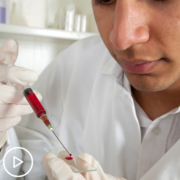Can Diet and Exercise Reduce MPN Symptoms? from Patient Empowerment Network on Vimeo.
What can YOU do to make a positive impact on your overall MPN care? Researchers Dr. Jennifer Huberty and Ryan Eckert review the latest research on how movement and diet can benefit people living with myeloproliferative neoplasms (MPNs).
Dr. Jennifer Huberty is an Associate Professor at Arizona State University. She focuses her research on the use of complementary approaches to manage symptoms and improve quality of life for patients living with myeloproliferative neoplasms. More about Dr. Huberty here: chs.asu.edu/jennifer-huberty.
Ryan Eckert currently works at Mays Cancer Center, home to UT Health San Antonio MD Anderson Cancer Center. Ryan is the Research Coordinator for the MPN QoL Study Group and assists in research related to complementary health approaches in myeloproliferative neoplasms and other hematological disorders. More about Ryan here: mpnqol.com/research-team.
See More From the The Path to MPN Empowerment
Related Programs:
Transcript:
Ryan:
So, as far as the benefits of exercise for MPN patients, there’s many, and so, I guess starting with cancers as a whole, there’s a lot more research that’s been done in recent decades that looks at the effects of various forms of exercise and physical activity on other cancers. They just tend – researchers tend to do a lot more of that work in breast cancer, lung cancer, colon cancer, et cetera.
And so, the research in exercise for MPN patients is actually really new, and nobody outside of Dr. Huberty in conjunction with Dr. Mesa and a few other researchers have done any research related to exercise specifically in MPN patients. Our yoga studies that we’ve done have been the first venture down that route for MPN patients. But, what we do know in general is that exercise has obviously systemic effects across the whole body.
So, you’re gonna get health benefits just in general from exercise, but as far as for MPN patients specifically, some of the things that we’ve seen with our yoga studies, which is obviously a form of physical activity, is that we’ve seen sleep improve in MPN patients, so we’ve seen a reduction in sleep disturbances or disruptions in their sleep, a quicker time to fall asleep, and then, less waking up throughout the night – so, just better sleep in general.
We’ve seen some reductions in fatigue that have been reported by MPN patients who have gone through our yoga studies, and then, we’ve also seen a few other reductions in some other symptoms, such as anxiety and reduced depressive symptoms, a little bit of reduced pain is another one we’ve seen. So, just in general, we’ve seen some of those effects on MPN patients through some of our yoga studies.
Dr. Huberty:
So, in terms of adding to what Ryan just said, I would just say that exercise – maybe yoga or walking – is good for your body. It’s good for your health. It’s a recommendation that we get 150 minutes of moderate-intensity activity every week. The more that MPN patients can be achieving that goal towards 150 minutes – yoga counting at that – the better off they’re gonna be, and it doesn’t have to be going for a run.
It can simply be going for a walk around the block. It can be standing at your desk when you’re working instead of sitting all the time. That’s not necessarily activity per se, but it is moving your body and less sedentary. So, I think just focusing on the more that patients can move their body every day, the better off they’re gonna be.
Dr. Huberty:
So, yeah, the role of diet in MPN patients – so, this is the beauty about the quality of life study group, because we have all these wonderful investigators that are part of the team, and we do have Dr. Robyn Scherber, who’s at Mays with Dr. Ruben Mesa. She’s doing some work with keto diet right now, so it’s very new, so I don’t know if you’re familiar with the keto diet, but it’s very high-fat and very low-carbohydrate, extremely low levels of carbohydrates. I wouldn’t tell any patient to go start doing those things unless they’ve talked to their physician for sure, but we do know that based on how you eat does certain things to your body.
So, MPNs have high inflammatory markers, and so, we wanna decrease inflammation; we probably wanna eat foods that are going to be anti-inflammatory. So, berries, let’s say, is a good example of fruits that are anti-inflammatory, almonds are anti-inflammatory, and I’m not a dietitian by any means, it’s just that things that I know to be true for my own diet because everybody should be thinking about having an anti-inflammatory diet.
Processed foods are not healthy. They are higher-inflammatory. Breakfast foods, eating out, and the foods that you get when you eat out a lot are going to be more inflammatory than not. So, just those small things – lots of vegetables. Vegetables are very good. Lots of greens. But, there is research going on – again, just like exercise and yoga, it’s in its infancy because MPN has been an under-studied population for years, and we’re trying to power through and make that difference.















